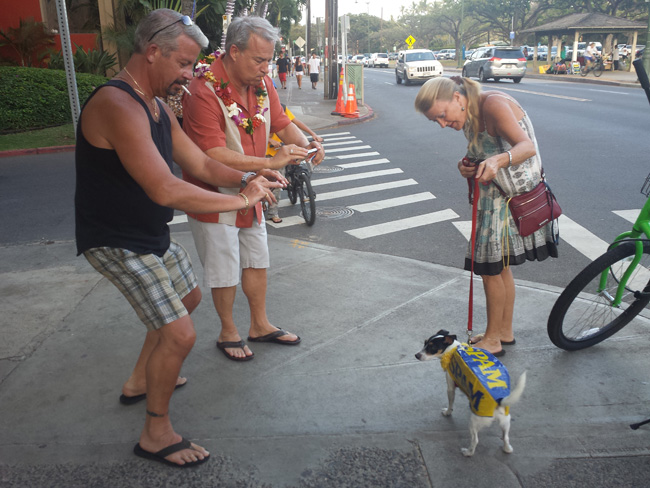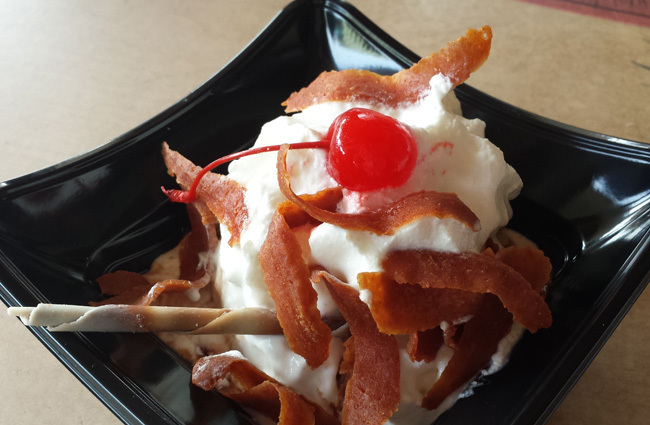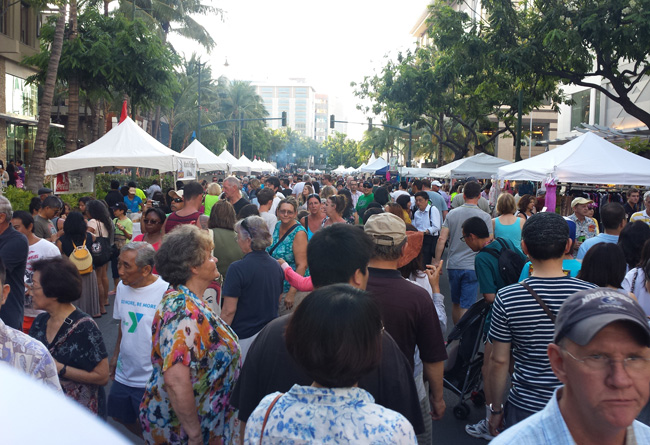
When admitting to a friend in Honolulu that I was attending the Waikiki SPAM Jam later that day, he quickly exclaimed, “SPAM? Dat Hawaiian steak, brah!” We laughed, but in retrospect we realized that was the most concise way to describe how ingrained into Hawaiian culture Minnesota-based SPAM has become.
The most simple explanation is that around the time of World War II, SPAM was introduced to the Hawaiian islands as a very portable and long-lasting meat that does not require refrigeration – all factors being unusually important in the most isolated population center on the planet. It was quickly integrated with many Asian, Polynesian, and Western-based foods. SPAM musubi, for example, which has more recently shown up in Minnesota, is so omnipresent in Hawai‘i you can pick it up at gas stations. A plate of SPAM, eggs, and rice is a common breakfast order even with the fast food chains operating here.
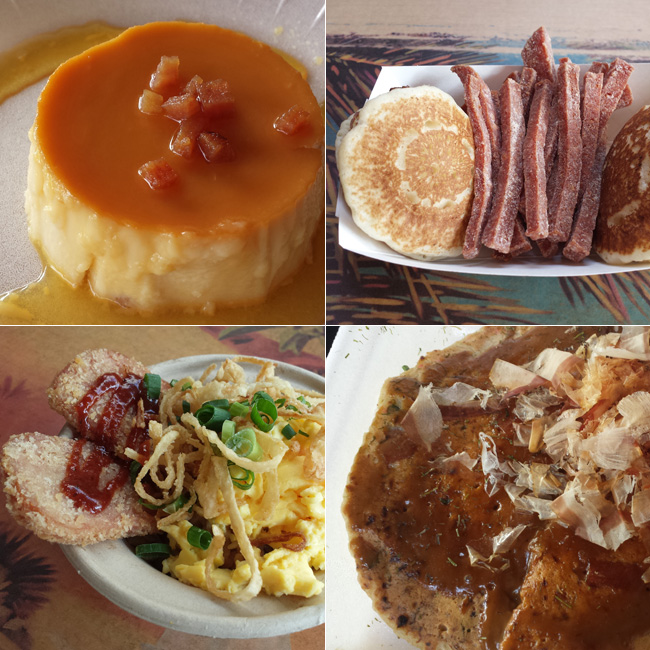
Every year, the Waikiki SPAM Jam closes off Kalākaua Avenue, arguably the busiest street in the most visited area in Hawai‘i, and local restaurants set up tents to serve SPAM-inspired dishes bookended with live entertainment and music stages. This year, according to Marketing Director Toby Tamaye, an estimated 28,000 people attended.
Some of the food included Buenos Antojitos’ Puerto Rican SPAM Flan ($4), which takes their already great flan and adds bits of SPAM for texture. Eggs ’n Things, a breakfast spot incredibly popular with Japanese tourists, shared SPAM pancake sliders served with SPAM fries ($8), which are essentially french fry-shaped SPAM. Hula Grill’s “Kanak Attack” ($12), named after the Hawaiian Pidgin saying for “eating so much you feel sleepy,” is a derivative of a loco moco: SPAM fried rice with SPAM katsu, egg, and their “special Kanak sauce.” Okonomiyaki Chibo designed a traditional okonomiyaki (a Japanese pancake-like concoction using flour, egg, cabbage, and mountain yam) with… SPAM ($8).
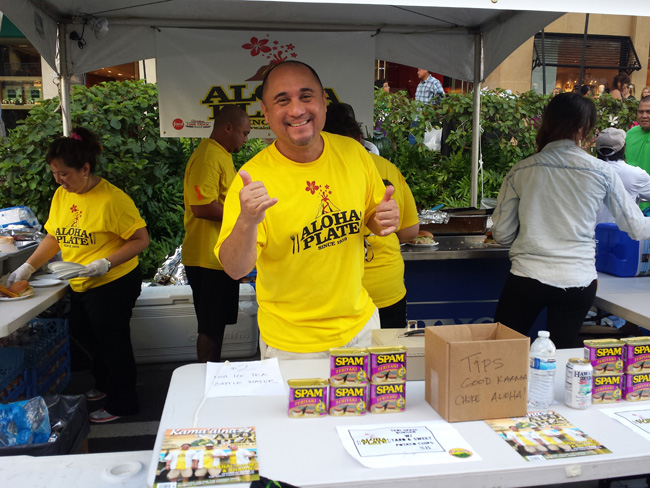
Among those serving SPAM-based dishes included Hawai‘i radio celebrity and entrepreneur Lanai Tabura and his brother, Chef Adam Tabura who, with comedian Shawn Felipe, recently won season four of Food Network’s The Great Food Truck Race. Their food truck, named Aloha Plate, competed against others traveling from San Francisco to Washington, D.C., enduring various challenges thrown by the producers along the way. “Minnesota was the turning point for us,” was the first thing Lanai Tabura said. “When we were in Minnesota, in the challenge we all got to make something with SPAM. We were the only team that knew how to use it!”
They were serving their winning SPAM Burger at SPAM Jam, which was their home debut with it after touring the mainland. Recalling their success with SPAM in the Twin Cities and how much that ingredient meant to them there, Lanai joked, “We renamed SPAM to stand for ‘Saint Paul And Minneapolis.’”
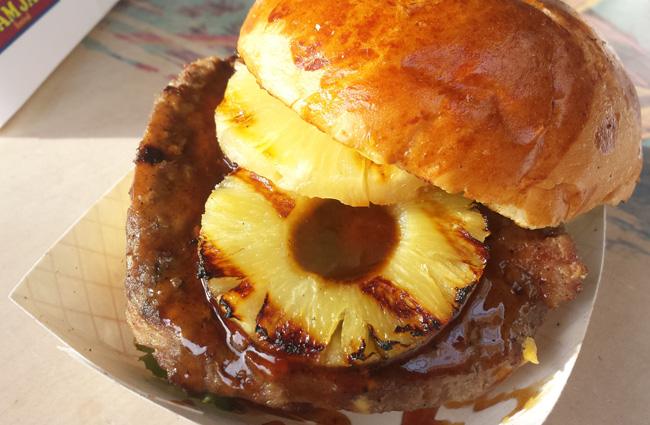
The Teriyaki SPAM Burger above ($7) from Mahaloha Burger was very similar to their normal burger served with free-range beef from Hawai‘i Island ($6.50), except this one has SPAM Teriyaki. Further offerings start to sound like a Monty Python skit: MAC 24/7’s Truffle SPAM Ramen ($4), ABC Stores’ SPAM and Macadamia Nut Sundae ($5), OnoPops’ Peanut Butter Ice Cream with Candied SPAM ($4), and Seafood Village’s SPAM Siu Mai ($4) and SPAM Manapua and Spring Roll ($3). The list continues: SPAM and Corn Chowder, SPAM Lau Lau, SPAM Pita Pockets, SPAM Street Tacos, Sicilian SPAM Pizza, SPAM Yakisoba, SPAM Pad Thai…
Toward the end of the event, I caught up with Hormel’s Nicole Behne, who was visiting Hawai‘i from Austin, MN. “Everyone is so nice here in Hawai‘i,” she said. “We’re so grateful everyone wants to share their love of SPAM.”
Here in Hawai‘i, there’s clearly a love of SPAM — it’s a staple and part of the food culture. Seeing the experimentation at SPAM Jam reminded me of the unique culinary techniques found at the Minnesota State Fair, such as putting foods on sticks and deep frying foods that probably shouldn’t be deep fried. In the end, both events involve new ways to explore old traditions, a diverse array of locals and visitors coming together, and a dash of silliness.
Behne agreed: “We’ve found that ‘Aloha Spirit’ and ‘Minnesota Nice’ have a lot in common.”
The next Waikiki SPAM Jam is scheduled for Saturday, May 2, 2015.
